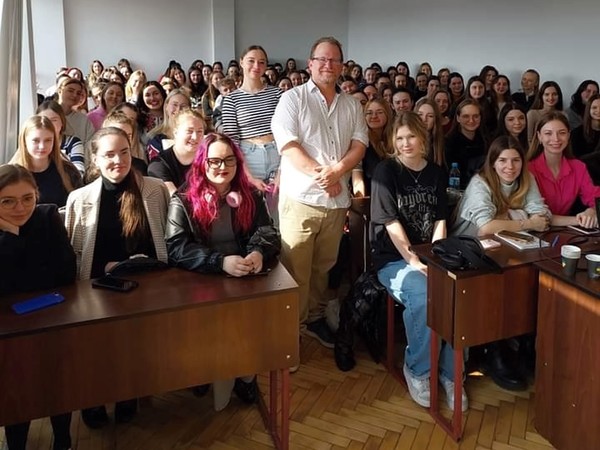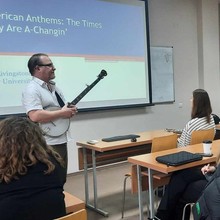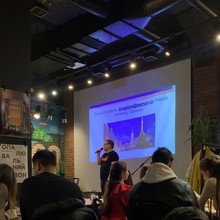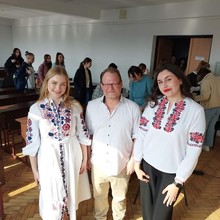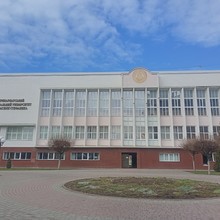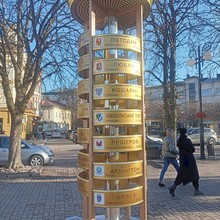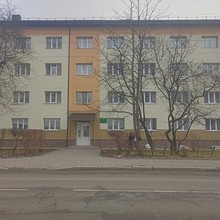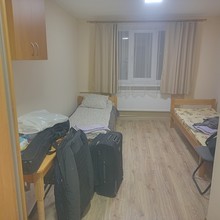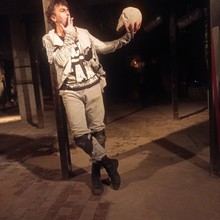The US citizen David Livingstone moved eastward in 1990, to former Czechoslovakia, after the Velvet Revolution. He is currently a member of the Department of English and American Studies, Palacký University Faculty of Arts. He decided to move further east once again in the year 2024. His reason is to now provide help to universities in war-torn Ukraine.
When David Livingstone from the Department of English and American Studies, sent not long ago a contribution about his first days at Vasyl Stefanyk Precarpathian National University in Ivano-Frankivsk to the editorial team of Žurnál UP, I decided to ask him some further questions. What does your typical day look like? What is life like in a country at war? And why did he actually decide to go to this country where the sounds of air sirens are heard constantly? He describes in this interview in some detail not only his current life, but the lives of academics and students in Ukraine.
How did you end up teaching at Vasyl Stefanyk Precarpathian National University in Ivano-Frankivsk?
My first acquaintance with this university was through the Ukrainian section of the Slavic Languages department at our faculty, specifically through Drs. Radana Merzová and Uljana Cholodová, the second of which is actually from Ivano-Frankivsk. These ladies introduced me to a visiting professor of literature from Precarpathian National University Prof. Ivanna Devdiuk about a year ago. I offered to teach some of the teaching staff online and this took place for about nine months with around ten participants on average. I shared the teaching duties with my former student and friend Dagmar Pavlov, whose husband is Ukrainian.
I eventually got to know the head of the department of English philology here Professor Yakiv Bystrov and he finally invited me (or to be honest I invited myself and he kindly agreed) and managed all of the paperwork on the Ukrainian side. I was also supported by my own department and head Dr. Ondřej Molnár and the faculty administration, specifically Dean Jan Stejskal and Vice-Dean Pavlína Flajšarová. The most difficult obstacle was to obtain the necessary insurance since Ukraine is obviously a war zone. I also have to express my appreciation for colleagues who took on extra work and teaching in order to cover my absence, specifically Dr. Ema Jelínková.
I was initially given three classes, two classes of British literature for fourth year bachelor students and one of Academic Writing for first year master’s degree students. I also visit the classes of other teachers in the department, provide special lectures at the university and elsewhere: at the local American Window library, at secondary schools and at cultural centers. Finally, I am organizing with the help of a group of students a film club in my dorm building. I will also be teaching online courses to students at other Ukrainian universities, specifically for Karazin Kharkiv National University and hopefully Kherson State University (many of whose employees have moved here to Ivano-Frankivsk and some of which share the same dormitory).
What actually led you to set off for this war torn country?
I have been organizing English courses for Ukrainian refugees in Olomouc for the last two years. Dean Stejskal kindly agreed to let us use classrooms at the faculty. This is still going on and is being financially supported by the American Embassy in Prague via our American Center at the university headed by Dr. Lukáš Merz. Two of my former students are actually teaching for free at the moment as we have limited financial resources: Mgr. Eva Železná and Mgr. Karolína Cohen (they both teach adults). Two of my current students are also teaching: Mgr. Margo Hordeieva (originally from Odesa, teaching three groups of children) and Matěj Kundrát (two groups of adults). All in all, around eighty Ukrainians are taught per week in ages from seven to seventy.
I have also done my best, along with my colleagues, to support the Ukrainian students at our department who are often overwhelmed by the new environment and system. Around six months ago, however, I realized that it was all fine and good to help Ukrainians on this end, but perhaps more important in the long run to help universities back in Ukraine. The country has already lost millions of talented people, not only as soldiers, but as refugees. There is going to be a tremendous problem with the brain drain phenomenon in the future, if and when peace is finally achieved. I think it is important for those of us in the West and specifically in academia to try to support our colleagues in Ukraine in order for them to maintain academic excellence and retain talented students and researchers in the country. I hope to contribute in my small way to this effort.
Vasyl Stefanyk Precarpathian National University is a large institution with 12 faculties and institutes. In addition, it has become the temporary home for a number of administrative employees and members of the academic community of Kherson State University. What is it like to live in that kind of environment, what kinds of feelings do you have, how do you perceived that kind of life?
The university here is by no means wealthy. I share an office at the university with around thirty other colleagues, which makes me appreciate the excellent conditions we have at Palacký. The classrooms and buildings could also use some investment, but this is obviously not the top priority at the moment. Having said that, the university and the city here are an oasis of calm and peace for people living in the East in or near the war zone. National Precarpathian University has provided some of the teaching and administration staff of Kherson State University with office space and accommodation in the student dormitories for the last two years and there is, of course, no end to the war in sight. Kherson Students are all taught online, which is not ideal but certainly better than nothing. I have only begun to get to know some of the Kherson faculty, but my impression is one of courage and determination. One of the Vice-rectors of the university has been living with his wife and daughter in a room the same size as mine, of around ten square meters, for two years.
What does your typical day look like?
I live in a student dorm and have my own room with a desk and the basics: shower, toilet and fridge. I have a fifteen minute walk to either the university or the city center. When I am not teaching, I work at home, either preparing my lessons and lectures or doing my own work. I am still running a lecture series at my department and have about ten students writing their theses with me, in addition to my own research of course. So plenty to do. I go out for a meal usually once a day. The restaurants here are on a very good level, as is some of the beer. I occasionally meet with colleagues for a meal or drinks. I have also been to the impressive local theatre and even seen an innovative modernized version of Hamlet set in a bomb shelter and staged in the basement of the building. I am currently working with a colleague from the theatre studies department here on a conference paper about this, and other Ukrainian Shakespeare productions which reflect the current reality. The city itself is lovely and I am looking forward to exploring the countryside when the weather improves.
Are you planning to visit other universities during your semester-long stay?
I will be spending four days in Lviv where I will be giving talks at three different universities. I will also be visiting Kyiv again and plan to give a talk at Taras Shevchenko National University and visit other cultural institutions. I also have scheduled visits to universities in Ternopil and Chernivtsi.
Which of your experiences do you view as most powerful? Is there something from Ivano-Frankivsk which you will always deeply remember?
There are air sirens and bomb scares on average twice per week, sometimes more often. Everyone has an App which tells them about the threat. Several times, this has gone off in the middle of one of my classes. Students and faculty are supposed to leave the building and classes are cancelled until the threat is officially over, usually around 90 minutes. University students just leave the campus and either go home or go for a coffee (Ukrainians are coffee maniacs, by the way). Students at primary and secondary schools, however, have to move to provisional classrooms in bunkers. This creates a constant uncertainty amongst both teachers and students, which is handled with humour and resignation, but obviously takes its toll. The threat is of course much more serious the further East you go.
I also admire the way people improvise, despite the obstacles placed in their way. We had our first film night last Sunday in the dorm and five minutes before we were about to launch the film, we had a complete blackout. I was ready to give up, but the earlier mentioned Vice-rector from Kherson excused himself and came back with a power box/generator, obviously used to situations like this. Due to lack of power, the Internet also kept dying, and various students provided their own routers to keep us online. In the end, we were able to watch the film and the experience (at least for me) was intensified by how much work it took in order to make it happen.
Practically everyone I have met has either lost a family member in the war or to immigration or to separation in Russian occupied territories. I expect to hear much more.
What would you like to communicate to people at Palacký University?
First of all, we have a great deal to be grateful for, not only peace in our country, but a stable economy and an excellent education system (not perfect of course). Cities in Western Ukraine especially look a great deal like our own cities (having a shared history of Austria-Hungary). Czechs and Ukrainians have a lot of shared history with colonization and the struggle for maintaining sovereignty and identity. The Ukrainian language and culture is very much alive and well (the war as most of us know has actually helped unify the country and spurred added pride in their language as opposed to Russian) and the people are very much deserving of our support and friendship. I am proud that my adopted country and our university has done, and is doing, so much to support Ukraine. The struggle, however, is far from over.
I came to Czechoslovakia in 1990 and have lived in Olomouc and worked at Palacký University since 1992, after my initial stay in Rožnov pod Radhoštěm. I have obviously seen a great deal of changes, mostly for the better. We are where we are thanks (not only of course) to support from the European Union and the United States and others. Although a happy converted agnostic, I am the son of a preacher man and will end with a verse from the Good Book, Gospel of Luke 12:48: “For unto whomsoever much is given, of him shall me much required.” I believe it is our duty to begin to pay back what we have received and do our utmost to help our sisters and brothers in Ukraine, not only militarily and financially, but also intellectually.
